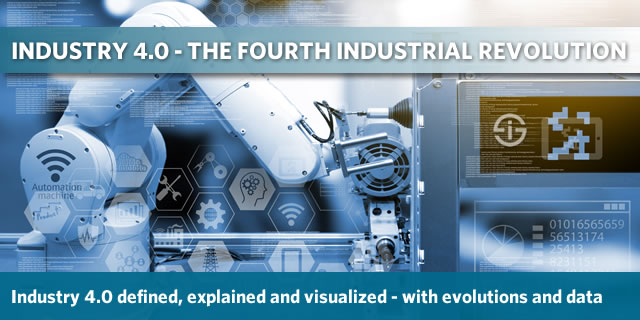
The value created by Industry 4.0 vastly exceeds the low-single-digit cost savings that many manufacturers pursue today (Boston Consulting Group)
When Germany launched a project under the name ‘Industrie 4.0’ to digitalize manufacturing at the Hannover Messe in 2011, the government officials, industry leaders and academics who were working on the project probably had no idea that Industry 4.0 would become such a widely used term and concept.
Despite the buzzword aspect, ‘Industrie 4.0’ or ‘Industry 4.0’, however, is a very real phenomenon, transforming manufacturing into digital manufacturing with additional benefits and a range of technological evolutions and possibilities to move beyond the sheer manufacturing operation dimension towards the fourth industrial revolution.
However, Industry 4.0 is far from a reality yet. Manufacturers in many ways still lag behind and the challenges are abundant. Before looking at the challenges, state and future of Industry 4.0 we need to look a bit deeper into what it is.
Industry 4.0 definition – the digital transformation of industry and the fourth industrial revolution
We define Industry 4.0 as the digital transformation of manufacturing, leveraging third platform technologies, such as Big Data/Analytics and innovation accelerators, such as the (Industrial) Internet of Things, and enabling the convergence of IT (Information Technology), OT (Operational Technology), robotics, data and manufacturing processes to realize connected factories, smart decentralized manufacturing and the digital supply chain in the information-driven cyber-physical environment of the fourth industrial revolution.
The initial goals in Industry 4.0 typically are automation, (manufacturing) process improvement and productivity/production optimization; the more mature goals are innovation and the transition to new business models and revenue sources with information and services as cornerstones. Industry 4.0 is also called ‘smart industry’ or ‘smart manufacturing’.
This is probably not the shortest Industry 4.0 definition ever and it does contain some terms we might need to explain further such as the third platform and innovation accelerators as they exist in the DX (digital transformation) economy, as well as the integration of IT and OT, which is key in the cyber-physical context of Industry 4.0 as we’ll see.
Industry 4.0 is also more than comparable with the Industrial Internet (better known in the US), in which the Industrial Internet of Things plays a big role (as it does in Industry 4.0).
A shorter definition of Industry 4.0: the information-intensive transformation of manufacturing in a connected environment of data, people, processes, services, systems and production assets with the generation, leverage and utilization of actionable information as a way and means to realize the smart factory and new manufacturing ecosystems.
The original definition of Industry 4.0 (or better: Industrie 4.0)
The definition of Industrie 4.0 as proposed in 2011 was pretty lengthy too. In a paper, entitled “Industrie 4.0 – Smart Manufacturing for the Future”, GTAI (Germany Trade and Invest) looked at the questions what is smart industry (a synonym of Industry 4.0) and what Industrie 4.0 means.
An extract: Smart industry or “INDUSTRIE 4.0” refers to the technological evolution from embedded systems to cyber-physical systems…INDUSTRIE 4.0 represents the coming fourth industrial revolution on the way to an Internet of Things, Data and Services. Decentralized intelligence helps create intelligent object networking and independent process management, with the interaction of the real and virtual worlds representing a crucial new aspect of the manufacturing and production process”.
Read the full paper “Industrie 4.0 – Smart Manufacturing for the Future” (PDF opens)
What is Industry 4.0 (according to several sources)?
If you wonder what Industry 4.0 is in practice, you’ll find more on the various aspects and evolutions further below.
However, if you need a description Industry 4.0 and seek an Industry 4.0 definition, which you can use for whatever purpose, take a look at the Industry 4.0 definitions we gathered from various other sources which, in many cases, are also excellent starting points to learn more about the pretty broad reality of Industry 4.0, the fourth industrial revolution and all its aspects.
Obviously not all definition of Industry 4.0 are the same. It’s as Marijn ten Wolde of Bosch Siemens Home Appliances said in an interview: “Industry 4.0 has a different meaning or for each company. Even within Bosch there isn’t one definition of Industry 4.0. It’s dependent on the strategy for each factory. The most important principles for manufacturing are connectivity and operational excellence”.
Source: www.i-scoop.eu

